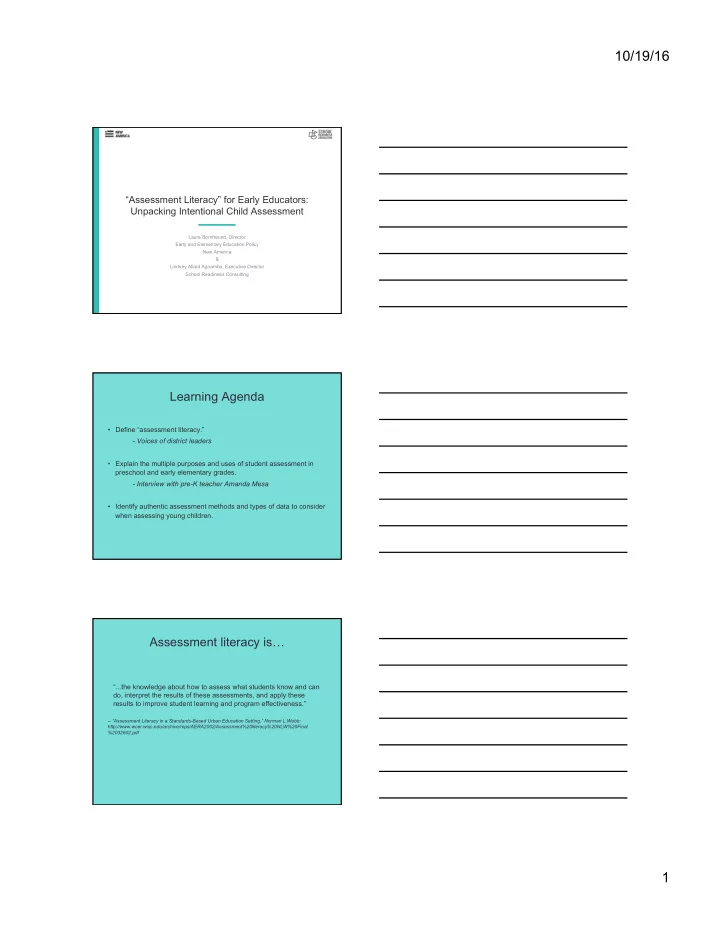

10/19/16 “Assessment Literacy” for Early Educators: Unpacking Intentional Child Assessment Laura Bornfreund, Director Early and Elementary Education Policy New America & Lindsey Allard Agnamba, Executive Director School Readiness Consulting Learning Agenda • Define “assessment literacy.” - Voices of district leaders • Explain the multiple purposes and uses of student assessment in preschool and early elementary grades. - Interview with pre-K teacher Amanda Mesa • Identify authentic assessment methods and types of data to consider when assessing young children. Assessment literacy is … “...the knowledge about how to assess what students know and can do, interpret the results of these assessments, and apply these results to improve student learning and program effectiveness.” -- “Assessment Literacy in a Standards-Based Urban Education Setting,” Norman L.Webb: http://www.wcer.wisc.edu/archive/mps/AERA2002/Assessment%20literacy%20NLW%20Final %2032602.pdf 1
10/19/16 Common ‘themes’ across definitions • What students know and can do • How to assess • Analyze and interpret • Apply to improve student learning • Improve and advance student learning Unpacking Assessment Literacy • How to assess what learners know and can do • Ability to interpret assessment results and apply to improve learning • Strategies to identify, select, and create formal and informal assessments • The responsibility of all educators, leaders, parents and policymakers Early Childhood Assessment: It’s Complicated Why? • Age and abilities of children • multiple domains • Limitations Courtesy of Flickr User woodleywonderworks. 2
10/19/16 Unpacking Assessment Literacy • How to assess what learners know and can do • Ability to interpret assessment results and apply to improve learning • Strategies to identify, select, and create formal and informal assessments • The responsibility of all educators, leaders, parents and policymakers Many Different Kinds of Assessment All with different purposes … • Identify children who may have special developmental or learning needs • Identify children in need of specialized services or interventions • Track students for comparison across program, school, district, state • Document and track student progress against specific criteria • Inform classroom learning • Evaluate programs, effectiveness of materials, and instructional strategies • Communicate with students and families Courtesy of Flickr User woodleywonderworks 3
10/19/16 Talking with a Pre-K Teacher Amanda Mesa is a lead pre-kindergarten teacher at Thurgood Marshall Child Development Center in Washington D.C. She has been in the early child development field for the last five years. In addition to teaching at Thurgood Marshall, Amanda is a volunteer for DC826, a nonprofit organization dedicated to supporting students ages 6-18 with their creative and expository writing skills, and to helping teachers inspire their students to write. Unpacking Assessment Literacy • How to assess what learners know and can do • Ability to interpret assessment results and apply to improve learning • Strategies to identify, select, and create formal and informal assessments • The responsibility of all educators, leaders, parents and policymakers Early Learning Assessment Landscape • Purposeful Assessment • Instructionally Aligned Assessment • Beneficial Assessment 4
10/19/16 What Types of Data to Consider? Classroom Environment Learning and Development Participation Behavioral Information Attendance Health Adapted from SEDL/Mid Atlantic Comprehensive Center. Images Courtesy of Flickr User franklinparklibrary . Authentic Assessment observation Child’s progress towards meeting learning expectations analysis documentation Attributes of Assessment-literate Educators 1. Understand the purpose for specific assessments 2. Establish learning objectives based on content standards and assessment data 3. Identify, select, and/or create appropriate assessments 4. Gather accurate, relevant student performance information 5. Analyze, interpret, and evaluate student performance data 6. Use assessment results to make decisions to advance student learning 7. Plan, differentiate, and modify instruction based on assessment data 8. Provide feedback to students and their families about student learning 5
10/19/16 Unpacking Assessment Literacy • How to assess what learners know and can do • Ability to interpret assessment results and apply to improve learning • Strategies to identify, select, and create formal and informal assessments • The responsibility of all teachers, administrators, parents and policymakers Everyone Needs Some Level of Understanding • Teachers • Administrators • Parents • Policymakers Laura Bornfreund bornfreund@newamerica.org @lbornfreund http://www.newamerica.org/education-policy/early-elementary-education-policy/ Lindsey Allard Agnamba allard@schoolreadinessconsulting.com @srctweets Schoolreadinessconsulting.com 6
Recommend
More recommend